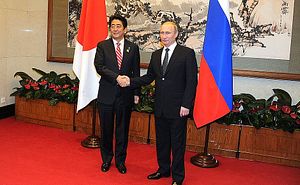Recent events have brought focus to one of the less well-known island disputes in Asia. The Kremlin announced it will deploy military forces to the Kuril Islands, or as Japan calls the island chain, the Northern Territories. This announcement came only three weeks after a private meeting between Putin and Abe in Moscow that unsurprisingly did not lead to any major breakthroughs in this prolonged conflict. The ongoing dispute over the islands is a vestige of World War II, which has become a central element of Russo-Japanese relations.
The dispute dates back to the 17th century, with both parties asserting sovereignty over the territory today because they claim to have first discovered or inhabited the islands. The San Francisco Peace Conference after WWII added to the list of prior treaties purporting to settle the fate of the islands but effectively only furthered ambiguity on the issue. While it is safe to say that both countries have some claims on the islands grounded in history and treaties, the islands have been under Russian administration since 1945. As a consequence, Japan and the Soviet Union/Russia never signed a peace treaty following WWII and the island dispute remains unresolved; lying low when relations are good, but flaring up periodically. The most serious post-WWII attempts at settling the issue in 1998 and 2001 both failed.
The Putin-Abe meeting in Moscow on May 5th was supposed to be the latest attempt in this effort and demonstrated an improvement in relations after a tense few years, during which Japan joined the West in imposing sanctions on Russia for its actions in Crimea and Eastern Ukraine. Given sanctions, low oil prices, and high inflation, the Russian economy is struggling – a fact that Abe is banking on, hoping that the incentive of improved economic relations will have positive effects on breaking the deadlock over the island dispute. With Japan seeking to diversify its energy supply and the Russian Far East being energy-rich, while economically underdeveloped, this would seem like a mutually beneficial solution. However, analysts believe the gains for Russia are insufficient to justify the concessions Japan seeks in the territorial dispute.
As if to underscore that prediction, the Russian Defense Minister announced only three weeks after the Putin-Abe meeting that Russia will deploy a coastal defense system and Aeleron-3 drones to create an area-denial zone over the islands to protect against foreign aircraft in the airspace over the islands. The Kremlin is even considering opening a naval base on the Kurils to host Russia’s Pacific fleet. The Japanese government protested Russian plans.
The islands are strategically important to Russia because they guarantee safe access through the Sea of Okhotsk to the Pacific Ocean for the Russian Navy. Russia’s military presence also serves to strengthen its involvement in East Asian affairs – although this probably does little to assuage Putin’s fear of fading Russian influence in the Pacific in light of Chinese and U.S. strength. On the other side of the dispute, the Japanese people, especially conservatives in Hokkaido, are emotionally attached to the islands and resource-starved Japan could certainly use the resource-rich Exclusive Economic Zone surrounding the islands.
Given these entrenched positions, the dispute is at a deadlock. Abe’s intentions of engaging in peace talks with Russia “with a new approach, free of any past ideas” is effectively dead on arrival. The militarization of the islands by Russia only cements the status quo and the deadlock in the conflict. For Western observers, there are two concerns that make it worthwhile to follow this relatively minor island dispute: the potential for increased Russian military strength in the Pacific, and the implications for Japan’s continued support of Western sanctions against Russia – particularly relevant given the EU’s extension of sanctions for another year.
The most interesting factor in this island dispute is what it says about the Russo-Japan relationship at any given point in time. Because neither side has any realistic expectation of resolving this conflict any time soon, the intensity with which the dispute is being waged is a good indicator of where the two countries stand in relation to one another. The Kuril Islands/Northern Territories serve as its very own little proxy dispute symbolizing the broader relationship.
Sarah Lohschelder is a MSc Foreign Service/Juris Doctor candidate at Georgetown University. She is a Defense Fellow at Young Professionals in Foreign Policy.

































